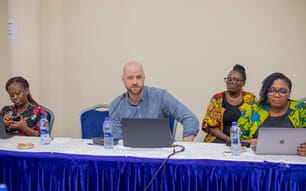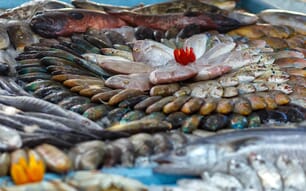Proposal 1: UN Sustainable Development Goal for the Ocean – Putting a healthy living ocean at the heart of development
To accelerate progress towards reversing ocean degradation and drive the global system for ocean governance, the Commission calls upon UN Member States and all relevant stakeholders to agree a stand Given the importance of the global ocean to issues of environmental sustainability, social justice, equity and governance, the Commission strongly supports and wishes to add its voice to the proposals made at the UN Open Working Group on SDGs aimed at a stand alone Ocean SDG.
Proposal 2: Governing the High Seas – Promoting care and recovery
Current ocean governance arrangements do not ensure sufficient protection for high seas biological diversity, nor do they foster the sustainable and equitable use of marine living resources. In particular, implementation of agreed instruments and commitments is not good enough. Effective rules and mechanisms to ensure the sustainable use and conservation of high seas biodiversity are missing, and there is no mechanism to achieve effective sectoral coordination. Strong domestic and international political leadership and engagement is needed to drive the necessary governance reforms to enable the global community to break out of this vicious cycle.
The Commission calls for:
• Strengthening UNCLOS through a new implementing agreement on the conservation and sustainable use of marine biological diversity beyond national jurisdiction in order to make it fit for purpose.
• Universal ratification of UNCLOS and the UN Fish Stocks Agreement of 1995, and the establishment of an annual meeting of States Parties to UNFSA to provide a platform for greater accountability.
• Regular independent assessment of RFMOs to improve their performance.
• Prompt entry into force and implementation of the FAO Port State Measures Agreement of 2009.
• The appointment by the Secretary-General of the United Nations of a Special Representative for the Ocean, with a clear mission and sufficient resources to significantly improve ocean governance.
• Creating Regional Ocean Management Organisations (ROMOs) to promote ecosystem-based management of the ocean.
• The appointment of ocean envoys or ministers by Heads of State or Government.
The Commission firmly believes that this package of interconnected, tangible measures would serve to strengthen the global system of high seas governance and advance the more sustainable ecosystem-based management of high seas resources.
Proposal 3: No More Overfishing – Ending harmful high seas subsidies
It is imperative to address the main drivers of fishing vessel overcapacity, in particular, the issue of capacity-enhancing subsidies. The Commission asks WTO member States to urgently adopt a three-step approach to deal with this problem and remove the negative financial incentives that maintain a global fishing fleet that has too many boats chasing an ever diminishing supply of fish.
Step 1: Full transparency (disclosure) of fisheries subsidies.
Step 2: Classification of fisheries subsidies in order to identify and distinguish those that are harmful.
Step 3: Immediately capping and then phasing-out high seas fishing fuel subsidies within five years.
Proposal 4: Illegal, Unreported and Unregulated Fishing – Closing seas, ports and markets
Illegal, unreported and unregulated (IUU) fishing on the high seas has significant negative ecological, economic and social impacts, and disproportionately affects developing countries. To effectively combat IUU fishing, the illegality of the practice needs to be uniformly established, the likelihood of being caught needs to be increased and market access for IUU fish needs to be cut off.
In order to combat, and end, IUU fishing:
• The Commission calls on members of the IMO to require that the mandatory requirements for IMO numbers and tracking already in place for merchant vessels are extended to all fishing vessels fishing
in the high seas.
• The Commission furthermore calls upon States and RFMOs to ban the at-sea transshipment of fish.
• All commissioners are committed to using their influence and to act in order to help fast-track the entry into force of the PSMA by urging all States who are not yet Party to the Agreement to expedite their instruments of adherence or ratification.
• The Commission calls on all stakeholders to work together to build a global information-sharing platform for real-time sharing of data on high seas fishing vessels and their activities so as to deter IUU fishing and promote traceability.
• Seafood retailers and processors must commit to sourcing sustainable seafood, including by adopting effective traceability systems.
• In order to support these goals, the Commission encourages civil society organisations to step up their role as independent RFMOs, flag States and Port States performance watchdogs, and calls upon
local, national and international authorities to cooperate with such independent watchdogs.
Proposal 5: Plastics – Keeping them out of the ocean
Plastics are a major source of pollution on the high seas and a health threat to humans and the environment. This reflects poor handling and waste management practices on land and requires a combination of political and regulatory action supported by an increase in consumer awareness.
It is important to increase efforts to address the variety of sources of marine pollution (persistent organic pollutants, hydrocarbons, heavy metals, nitrates, radioactive substances, marine debris, etc.).
In particular, the Commission calls for coordinated action by governments, the private sector and civil society to eliminate plastics entering the global ocean including by:
• Minimising single-use plastics by direct government intervention and consumer incentives.
• Creating incentives to promote recycling, including single polymer products and extended producer responsibility.
• Establishing time-bound quantitative reduction targets.
• Achieving improved waste management.
• Promoting consumer awareness.
• Replicating local initiatives to restrict or ban certain unsustainable uses of plastic materials (i.e. bans on disposable plastic bags, polyurethane packaging, etc.) and clean-up programmes.
• Addressing lost and discarded fishing gear, in particular FADs, to avoid abandonment.
• Encouraging XPRIZE-like innovation around substitution, waste avoidance, recycling and clean-ups.
• Exploring taxation and other levies to establish a Global Marine Responsibility Fund to build waste management capacity, coordinate action to combat marine plastics, grow sustainability initiatives,
and change the behaviour of industry and consumers.
Proposal 6: Offshore Oil and Gas – Establishing binding international safety standards and liability
One-third of the oil and one-quarter of the natural gas consumed in the world today come from underwater areas. Oil and gas exploration and exploitation is moving further and deeper offshore.
The water column above the continental shelf beyond 200 nautical miles from the baseline is part of the high seas, even if that outer shelf area has been claimed by a coastal state. Fixing a problem in the midst of an accident in deep waters is complex and expensive and can cause significant ecological harm. There is a lack of universally agreed environmental and safety standards for offshore drilling on the continental shelf.
The Commission supports efforts to adopt and improve international safety and environmental standards for offshore drilling on the continental shelf, including regional protocols to establish and implement such standards, with provisions for response-preparedness and capacity building in developing countries. In line with the polluter pays principle, the Commission also supports the development of an international liability convention to cover damage to the marine environment from offshore oil and gas installations.
Proposal 7: Global Ocean Accountability Board – Monitoring progress toward a healthy ocean
The Commission recommends the establishment of an independent Global Ocean Accountability Board to monitor and assess whether sufficient progress is being made towards achieving the proposals recommended by the Commission through which to reverse the degradation of and then regenerate the global ocean and to secure effective and equitable governance. The Board would benchmark, on a regular basis, the progress being made by the international community towards meeting the specific proposals contained in this report, and make this information public.
Proposal 8: Creating a High Seas Regeneration Zone
The Commission recognises that continued scientific research is necessary to evaluate the cumulative impacts of human activities on the high seas so that informed decisions can be made about reversing the degradation of the global ocean. This said, the precautionary principle tells us that a lack of scientific information cannot be a reason for inaction by the international community if we are to ensure the health of the global ocean.
We are convinced that our proposals, if implemented, would reverse the cycle of degradation. But there is a long history of good proposals not being implemented. If this happens, and the result is the continued decline of the high seas, it will impact the whole ocean and people and systems across the planet, because of the specific regenerative capacity of the high seas.
We are concerned to ensure that if the health of the global ocean does not improve, then consequences should follow to save this vital natural resource. The Global Ocean Accountability Board should provide independent monitoring of progress. If it reports continued decline after a period of, say, five years or similarly short period of time, then the world community of States should consider turning the high seas with the exception of those areas where RFMO action is effective – into a regeneration zone where industrial fishing is prevented. Such action would need to take account of RFMO functions within EEZs, and would need to include provision for the ban to be lifted as effective proposals for resource management are put in place for the conservation and management of living resources in the respective areas. The objective of this trigger mechanism and the associated regeneration zone concept is to make fish stocks sustainable for present and future generations, and< to replenish ocean life equitably to secure the wellbeing of this global commons for the health of the planet, its people and its biodiversity.
July 2014



